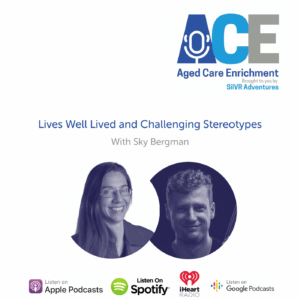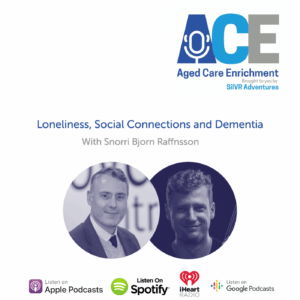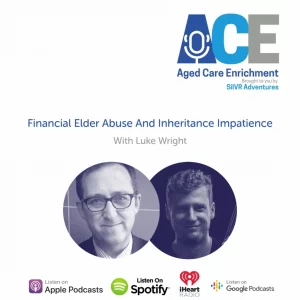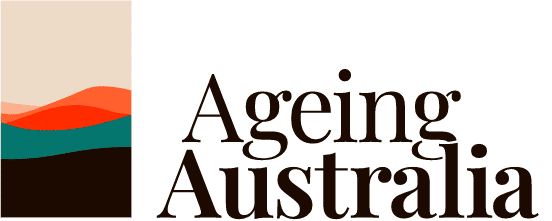Dr. Rodney Jilek is an experienced consultant within the aged care industry who specialises in helping non-compliant aged care providers achieve the minimum standards for certification. Aside from his work with his consultancy Aged Care Consulting and Advisory Services, Rodney is also the founder of Community Home Australia, a new not for profit provider with a small home model.
As Rodney has lots of hands on experience of working with providers that have failed some aspect of their accreditation, he’s very in touch with the difficulties providers face and how poor organisational culture translates to poorer standards of care.
Rodney issues a challenging statement about the reality of providing care in large organisations. And suggests that only through smaller numbers can appropriate care be given:
“And as much as you want to provide person centered care in an enormous facility with a hundred people, you simply can’t. You just can’t do it. Doesn’t matter how hard you try you can’t because the numbers just kill you. So you have to work with much smaller numbers.”
Transcript
Ash de Neef: Well Rodney, thank you so much for joining us on the show.
Dr. Rodney Jilek: Pleasure. Thank you for having me.
Ash de Neef: Absolutely. And for those of our listeners who don’t know who you are, can you give us a bit of your background and your story?
Dr. Rodney Jilek: Yeah, certainly can. I’m a registered nurse by profession. I’ve worked in the aged care sector for about 30 years now, both for the Commonwealth and for providers of residential aged care services. I currently have a consultancy called Aged Care Consulting and Advisory Services, and I’m the managing director of a new not-for-profit organisation called Community Home Australia.
Ash de Neef: Great. And I’d love to talk about Community Home Australia in a little bit, but let’s look at the Aged Care Consulting and Advisory Services.
So you work closely with care providers that have failed aspects of their accreditation. What do you often see within these organisations?
Dr. Rodney Jilek: Yeah, certainly that’s a bulk of our work is working with services that have either identified issues themselves or more frequently had issues identified by the commission in terms of failings in accreditation visits or assessment contacts.
And so we work directly with those providers to put together plans and address the issues that they may have. We see a whole range of issues, everything from minor areas through to systemic issues across multiple aged care standards. And so there’s no one thing that we see consistently apart from governance.
And governance is an enormous issue for providers, particularly individual providers, standalone providers, but where we’re starting to see more issues coming up in governance from larger organisations where the executives may spend a lot of time in their head office, but not so much time in the individual services.
And so there’s a disconnect between what the organisation is saying is happening and what is actually happening in the services.
Ash de Neef: So this would lead to a lack of communication amongst the different levels of the organisation. Right?
Dr. Rodney Jilek: Very much so. And a real disconnect between the things that are required to practically run a service and the systems that are being put in place by the people that are often hundreds of thousands of kilometers away from the service, usually sitting in a capital city. So we see issues particularly around policy and procedure and about auditing and management of concerns and issues that are raised.
They’re probably the main things that we often see and that the agency or the commission has been picking up more recently is around risks. And how the organisation identifies risks and then actually manages those and addresses those risks in a timely manner.
Ash de Neef: Wow. So if you’re working with a provider to try and improve a certain aspect of their service, it might turn out that a lot of the time you’re looking at structural issues as well and how to facilitate a better flow of information and a more supportive environment. Is that the case?
Dr. Rodney Jilek: I think there’s structural issues, both in terms of systems and reporting and responsiveness. And then there’s also basic structural issues around buildings and the way that the layout of a building can impair the staff’s ability to actually meet the requirements.
So we have a lot of older buildings in this country that were state of the art back in 1980 when they were built. But are not built in a way that enables residents to be provided care that is dignified and private and respectful.
Ash de Neef: So how would you, how can you help an organisation overcome something as big as a physical structure of a building?
Is it you just provide advice and you say, this is what you’ll need to do, or do you step them through the process as well?
Dr. Rodney Jilek: There’s usually two components of that. One is actually fixing the immediate non-compliance and fixing it in a very practical way or almost a band-aid solution if you like to address the immediate concern. And then working with them to give them advice and support on how they need to change longer term.
And I can give you an example, a really good example of that. We assisted a service that had failed privacy and dignity. And it was around their bathrooms. So the service was an older building with the old ablutions block bathrooms. They had one bathroom with about six or eight toilets and showers in it.
And that one bathroom serviced about 26 residents.
Ash de Neef: Wow.
Dr. Rodney Jilek: So that’s something that was in the day was quite usual and this service has just never brought that up to the newest standards. Now, the issue that the commission had was because the doors were so big and heavy, everyone left them open, which exposed the residents.
There was privacy issues. There was dignity issues and we had to come up with a solution that could be done very quickly because the commission only gives you certain, very short time frames to fix things. But also wasn’t going to cost an enormous amount to rectify because the longer term solution is to rip out the bathrooms and redo them.
So the solution that we actually came up with was a little bit outside the box, but if any of you have been to an old fashioned butchers. And you’ve seen the old butchers curtains, the translucent plastic butcher’s curtains, that’s how we rectified that issue. So on the main door that was leading to the corridor, we put up the butcher’s curtains. They’re easy for residents to go through, even if they’re in wheelchairs or they’ve got walking frames. But they closed immediately and they provide a level of privacy that wasn’t there before.
So is that a great long-term solution? No, definitely not. But did it resolve the immediate concerns around privacy and dignity without making it impossible for residents to access the bathrooms and toilets? Yes, it did.
And so that’s what we ended up doing and that ended up passing and then the provider had a plan forward, to work out how they were going to redesign that interior of that building to make it meet the standards longer term.
Ash de Neef: Great. And calling out the two sort of stages there, there’s a triaging stage where you’re really dealing with the immediate concerns and getting them across the line and then looking at longer term solutions.
Do you find that organisations exhibit a similar willingness to fix both aspects to address both parts of the problem?
Dr. Rodney Jilek: Look, it’s really dependent on the provider. So we’ve certainly dealt with a number of providers that have literally just said, “Rodney, we know we’re in trouble. Tell us what we need to do and we’ll do it.” And those services tend to rectify their issues very quickly. They work with us to put in sustainable changes and improvements, and then they go on to not have issues in the future.
The flip side of that is, is there are some providers that do not want to spend any money, do not want to make any changes beyond the immediate. And even some of those immediate changes that we put in, as soon as their noncompliance is overturned, they go back to their old ways.
So it’s a very mixed bag of providers. What we always try and do is identify the immediate concerns, fix them, but do it in a way that is sustainable as well. So we try and avoid the purely band-aid solution of just going in for two weeks and fixing things.
All of the rectification of systemic noncompliance takes at least three months if not longer. And that’s why when the commission issues things like a notice to agree or a sanction, the periods are usually six months or can be longer because that’s how long it takes to actually put in the changes. Train the staff, improve practices, change the culture of the organisation, which is really the biggest issue, and then make it a sustainable change.
Ash de Neef: And now the non-compliance issues, there are linked to standards set out by the Australian government and something that we’re seeing a lot in the wake of the Royal commission is this discussion about where the role of government and where the role of industry comes in.
Do you think the industry has any business in self-regulating itself or there needs to be external government oversight?
Dr. Rodney Jilek: I think the sector would love to self-regulate itself. Personally. I don’t think the sector is capable of self regulation only because I’ve been in it for 30 years and there’s really been no move, tangible move towards that in that period of time.
One of my biggest criticisms of the sector is that unfortunately the groups that we tend to deal with, are ones that have issues, we don’t tend to go to ones that are doing it well. But through those people that we do deal with we see this mentality of crawling towards the minimum standard line and literally nudging your toes up against the line.
And that’s, as far as we’re going to go. And I understand that a lot of that is money related -funding related. And that’s certainly been a big push of the sector and the peak bodies is around money. But I think you have to have the two in tandem.
So you can’t just have more money if you don’t have a willingness to actually go beyond a minimum standard. And from my perspective, I don’t see a lot of that willingness to move above and beyond what is set out by government.
Ash de Neef: Yeah. Do you think it’s possible to change the culture in these organisations to one of not just scraping through?
Dr. Rodney Jilek: I think there are some organisations that have and do move beyond that and they’ve shown very successfully that they’ve been able to look at alternate models. Albeit within a mass produced kind of setting where we’ve got large numbers, but they’re still looking at alternatives.
There’s a couple of organisations that have very successfully looked at diversifying. And so bringing in medical centers and daycare centers and all sorts of other different services and mixing aged care with assisted living and independent living. And some of those organisations have done very well. And interestingly, they’re not the ones that are screaming with their hand out saying, give me more money, give me more money.
So it can be done obviously. But yeah I think it’s up to the sector to actually put their foot forward and start moving ahead and saying, “we can do these things and we can look outside the box instead of just waiting for government to dole out oh, this is your next move,” which seems to be the history of the sector.
Ash de Neef: Yeah. Speaking of government doling out the next move several months ago that the final reports from the aged care Royal Commission were released and. It’s a bit unclear at this stage, what change is going to come of that? Do you feel like there’s going to be the sorts of widespread and systemic change that we need?
Dr. Rodney Jilek: Look I’ve been quite skeptical about the Royal commission from the start really. Because we’ve had so many reviews and assessments and nothing much really has changed. There’s been tinkering around the sides and little bits of change in pockets, but there certainly hasn’t been any widespread reform which the sector obviously needs.
It’s good to see now that the peak bodies have moved from their position of “it’s only the very few, the small minority that are letting us down and the rest of us are really good and we’re doing a fantastic job. And this is evidenced by our 500 awards that we give out to our members every year.” And so they’ve moved from that to, “okay. We’ve got a problem.”
And I think as with most issues, the first step is to admit that you’ve got a problem. I just think it’s coming back to that same old, “we’ll wait for the government to tell us what to do.” They just appear in capable of saying, “we’re going to do this and this. And we expect our members to do these things. “
Even though the two larger peak bodies have now come out and said, “we expect providers to sign up to our, our voluntary codes and all the rest of it.” it’ll be interesting to see whether they actually put their money where their mouth is and when providers don’t do the right things, they boot them out and that’s traditionally not happened.
So there’s the peak bodies have been very much protective of their members and their membership. And they’ve been very reluctant to actually boot anyone out for not doing a good job and, almost bringing the sector into disrepute.
So do I think there’s going to be widespread reform? Probably not. I’d be very surprised. One because the Commonwealth can’t afford it. And so unless they’re able to come up with some alternative funding arrangements that are actually affordable, they’re just not going to be able to afford the changes that people want. And that’s going to be an ongoing issue.
But as always with aged care, aged care stays in the news when there’s something horrific happening. And when nothing else is happening in the world. And as we’ve seen over the last 12 months, the Royal Commission barely got a look in because it got wiped off the face of the planet by COVID.
I made the comment the other day with all of the issues that are happening with the federal government at the moment and the politicians, I wonder how long it’s going to be before those pesky boats start coming back again. Because it’s all appears to be diversionary tactics to get everyone’s attention away from the issues that need to be addressed.
Ash de Neef: That links to something Sandra Hills said on the podcast a few weeks back when she was mentioning that there’s a push towards getting a groundswell movement going here and getting change will only really happen when the people demand for it.
Do you think that’s the most likely driver of change?
Dr. Rodney Jilek: Honestly, I think so. I think it’s been evident with the NDIS and how that’s evolved out of people living with disabilities have demanded better services and more person centered services. Whether the government is willing to go down that path with older Australians as well is yet to be seen, but there certainly needs to be a push.
And I think that’s been one of the biggest issues for the sector is the sector itself is so disjointed that there’s no one push. So I just found out this week that there’s another new aged care peak body. So we now have seven.
And so there’s been an attempt this year to bring them all together under the, the collective or collaboration or whatever they call it now. But it’s the same people that’s been one of my biggest criticisms. This is the same people sitting at the table, pushing their own barrow. And it’s the same people that have been there for the last two decades.
So while there’s younger people coming and I know LASA has their next gen program. But while you see these younger people and newer people coming into the sector, they’re not sitting around the table in the important times when things are being decided and things are being argued.
So it’s the same 8 or 10 people that have been there.Since I was first in the department, 25 years ago. And so you’re not getting any change and there’s this great resistiveness to change because providers themselves have invested in an enormous amount in this system. This system has been around for a very long time know, even before 97 with the new act, it wasn’t that different.
The funding was still very much the same, the sector was very dependent on Commonwealth funding. And so the sector has been the same for a long time. And there’s no great impetus to actually move from that. We still have providers that are building, 200, 250 bed homes. So while they’re continuing to build that is not going to change.
Yes. They’re getting nicer. But as I often say, people d go to a five-star hotel for a holiday. They don’t live in a five-star hotel. They go to a Michelin star restaurant for, a luxury night out. They don’t eat in a Michelin star restaurant every night of the week.
And while we seem to be moving to cater towards that higher end of town that can afford those services, really the bulk of aged care services haven’t changed very much in the last 20 or 30 years.
Ash de Neef: Well your launching Community Home Australia, your not-for-profit aged care provider. How are you going to tackle this problem differently?
What different services are you offering?
Dr. Rodney Jilek: The main reason that I established the organisation was really to look at what we could do differently, what we could do in terms of small scale, that would allow people to continue to live in their community. And not have to go into a building where they shared their personal space with, 50, 100, 200 people.
So our first home in Canberra, which opens up very soon, hopefully in the next couple of months will really be a test case for us to see will this work? On paper it all works. And basically what I’ve done is taken all of the learnings from the last 20 odd years in running aged care homes and dialed it down to just having six beds.
And look we’ve had to be flexible. We’ve had to be innovative and look outside the box because a lot of the traditional aged care services and providers are geared up to provide services for 50 100, 200 people. So when you go to them with, “I’ve got six beds”, they look at you and go, “it’s not worth my while.”
So through that process, we’ve been able to engage with a number of service providers that are either not in the aged care space at all, or are looking to get into the aged care space and are working in other markets or in other countries, and basically partner with them to implement some really innovative stuff.
We’re looking at a whole range of things like that. The universities are getting on board. So that system ,we’re actually embarking in a research project with three universities in Australia. And it’s part of a worldwide research project on improving aged care and residential aged care in falls prevention.
So I guess our biggest difference and the feedback that we’ve got from a number of quarters has been our ability to be flexible and say yes. So we have no huge board that has to mull over things for three months before they make a decision. We have a board of four. And we can make a decision in an hour and we’re open to doing things that are not the norm.
So there’s a museum in Canberra that has been trying to run an aged care project with aged care providers for a couple of years now. And hasn’t been successful in getting anyone to say yes. So when they came to us, it was a no-brainer. Yes. Come on. Let’s do it. So it’s all about linkages and keeping everything small scale residential.
Ash de Neef: Yeah. Wow. And I think maybe to people who have more of a background in traditional care services, this might not seem like a financially viable model. How is it that you can run this service without making a loss? Is it, you have to do some re-jigging here of the traditional system?
Dr. Rodney Jilek: Yeah, look, that, that was certainly a big part of it because although I’m personally funding the whole start up, this was not something that I wanted to fund for the rest of my life. So the whole project had to be self-sustaining. It will obviously become more self-sustaining once we have more than one house.
And the plan is that once this house is up and running, that there will be more than one house, but it had to be self-sustaining as one .That was certainly a juggle when you came down to, we only have six guests and I want to put on staff 24 hours a day. And my staffing ratio is one to three 24 hours a day with a registered nurse on site five days a week, full time.
It was certainly a challenge. But we wanted it to be a not-for-profit. So we’ve deliberately gone down the not-for-profit path and it’s not set up or intended to make an enormous profit it’s set up to basically break even and make enough money to be self-sustaining to be able to afford its improvements or to expand.
So we’ve prioritised. We don’t have an enormous marketing budget. We don’t have trips away for all of our executives. Our board are not on $100,000, $200,000 salaries. So we’ve basically said what is important for the organisation? The care of the guest is important and what we’re able to provide.
And so that’s what we’ve prioritised. That’s why we’ve called it “aged care your way”, whatever you want, our immediate answer will be yes. And then we’ll work out how we’re going to do it. And we don’t want to say no, unless it’s illegal or it’s going to be detrimental to other people. Then our answer will be yes. And we’ll just work out how we’re going to do it and we’ll get people there.
So that’s really been the big push of the house. The feedback we’ve got so far has been enormous. We’ve been running a fundraising program that’s been really well supported, which has been fantastic. And that’s allowed us to buy a whole heap of things that will directly improve the life of the people who come and live there.
And we’ve already got the first person and the first person is all lined up, ready, waiting to come in. They’re NDIS approved and they just want to come because they need care. They don’t want to go into a facility. They’ve looked at all the facilities. They just don’t want to go there. The lady who is coming in had one question, can I continue to ride my bike?
Yep. No-brainer. If that’s what you want to do, that’s what you can do. It’s really about flexibility and it’s truly person centered care. And as much as you want to provide person centered care in an enormous facility with a hundred people, you simply can’t. You just can’t do it. Doesn’t matter how hard you try you can’t because the numbers just kill you. So you have to work with much smaller numbers.
Ash de Neef: Yeah very exciting. And we’ll all be watching very closely to see how it goes with the launch. And this could be, the start of a new wave across Australia in re-examining the structures of aged care services.
You’ve also worked within culturally specific aged care scenarios as well. With Gallipoli Home in St. Elizabeth home. How did those experiences differ from general care?
Dr. Rodney Jilek: I think that the best thing, if I can say best thing that those experiences taught me was to really ground me in person centered care, because when you’re dealing with residents from other cultures and you’re not from that culture, it really opens your eye to looking at that person just as an individual.
As an individual human being that has wants and needs that you, as the provider needs to address. And I’m sure he won’t go cross at me for saying this, but a number of years ago, I was speaking to father Nicholas, who was the CEO of some Basil’s home in Sydney. And he posed a question to me and it was around dealing or assisting people that in a culturally sensitive way.
And my response to him was “their culture doesn’t matter. It’s irrelevant”. And he looked at me at the time and I’m sure he thought I was a raving lunatic, but that’s very much the way that I approached people. And that Community Home Australia will be approaching people. Your background is irrelevant.
We look at you as an individual that comes to our service and what are your needs and wants whether they be religious, cultural, food, personal. It doesn’t matter.
Even though we’re only going to have six people, I would fully expect that each of those six people will have very different needs and supports, and very different activities because everything is going to be tailored to them as an individual.
That was the best lesson I learned in those organisations. Then look, through my consulting we’ve worked with the Sri Lankan community, with the Cambodian community, with the German community, a whole range of different ethnic groups. And each time you work with those communities, you learn something else because they bring something else to you. And you add that to your bow. And it reinforces that notion of you just have to treat people as individuals.
It’s simple. But for some reason, it’s just not. Like I see all of these things about rainbow communities and welcoming, accepting gay and lesbian communities. I look at it and I think. “So? Shouldn’t we all do that?” it doesn’t impact on me, who you decide to have as your life partner. And it’s the same with all of the ethnic groups that, that we’ve dealt with over the years. It doesn’t kill me if I have Muslim clients that need to pray often during the day. Or wash during the day.
So it’s just something that you incorporate into the care that you provide and it’s the care that individual needs.
So to me, it’s very simple.
Ash de Neef: Yeah, that’s great. I think maybe on its surface, it sounds a bit counterintuitive at first go. “Oh, but surely the culture is important?” Yeah, it’s important to the individual, but it’s not something that should govern broad decisions because there shouldn’t be broad decisions. They should be person centered running.
We’ve covered so much today. And I really appreciate the fresh take that you’re bringing to this. Is there anything else you wanted to cover today before we leave it there?
Dr. Rodney Jilek: No, I think it’s been fantastic. It’s been wonderful to meet you and to speak with you.
My only parting thing is that I just hope that people are able to look at what we’re doing and use it as some kind of inspiration for them to do things themselves.
So we’re taking on this project in a very different way than is normal for aged care. So normally organisations do these kinds of things. They keep all of their secrets, they won’t share anything. They’ll charge people to come and have a look at this service. There are some services that are charging up to a thousand dollars for people to come and visit. You know, it’s insanity.
So the whole aim of this is we’re trying this. This is a risk that we’re taking to make this work, but please, if people want to come and have a look. Let us know if you want to take parts of it and try it in your own community, go for it.
We’ll actually help you. So this whole project is about getting an outcome for people who require care and services, particularly those living with dementia, and then particularly those with early onset dementia. So our aim is to enable the country to provide services that meet the needs of people. Not build an empire that is mine, that I can, laud over some king. We’re more than happy to share that.
So one of the things we’ve already said is particularly for called communities, if this is something that interests you contact us. We’ll help you set one up for your community and you can start on that path of providing care services for your community as well that’s tailored to their needs. So that’s my wish.
We’re open. We’re happy to talk. We’re happy to share. And we just, we really want the outcome for the individuals.
Ash de Neef: Fantastic. And people can find out more at communityhomeaustralia.org. That’s correct. Isn’t it?
Dr. Rodney Jilek: That’s correct. Yes.
Ash de Neef: Perfect. Thank you so much for your time today.
Dr. Rodney Jilek: Pleasure.






